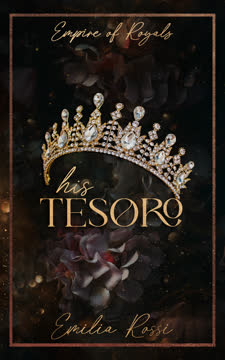Plot Summary
Broken Childhoods, Broken Loyalties
Sergei Belov, once a gentle, protective boy, is forcibly molded into a government weapon through the Z.E.R.O. black ops program. His handler, Felix, repeatedly warns that Sergei is not fit for violence, but his warnings go unheeded. Meanwhile, Angelina Sandoval grows up in the shadow of her father's Mexican cartel, learning to survive in a world where love is rare and trust is dangerous. Both are marked by dual trauma and healing—Sergei by the missions that fracture his psyche, Angelina by the constant threat of violence and betrayal. Their lives are set on a collision course, each carrying scars and secrets that will shape their destinies.
Hunger Strike and Escape
Angelina's world shatters when her father is murdered by his partner, Diego Rivera, who seizes power and demands Angelina as his bride. Imprisoned and starving herself in protest, Angelina's only hope comes from her loyal nana, Guadalupe, who orchestrates a risky escape. Disguised as one of Diego's trafficked girls, Angelina is smuggled out in a drug shipment bound for Chicago. Her journey is fraught with fear, hunger, and uncertainty, but her determination to survive and avoid a forced marriage propels her forward, even as she leaves everything familiar behind.
The Protector's Dilemma
Sergei, now a trusted enforcer for the Russian Bratva in Chicago, is assigned to intercept the drug shipment. He discovers Angelina, half-dead and traumatized, and is instantly reminded of his own failures to save innocents in the past. Despite orders to treat her as cargo, Sergei's protective instincts override his training. He brings her to his home, determined to nurse her back to health. The act of saving her becomes a lifeline for Sergei, even as it threatens to unravel the fragile control he maintains over his violent impulses.
Prisoner of the Bratva
Angelina awakens in a strange house, guarded by a massive dog and a man whose reputation for violence precedes him. She lies about her identity, fearing the Bratva will return her to Diego. Sergei, however, quickly sees through her story. Their interactions are tense, laced with suspicion, but also with a growing, inexplicable trust. Angelina's resourcefulness and Sergei's unexpected gentleness begin to erode the walls between them, even as both remain prisoners—she of circumstance, he of his own mind.
Unraveling Lies and Truths
Sergei uncovers Angelina's true identity as the cartel princess and confronts her. She confesses her flight from Diego and the horrors she endured. The Bratva's leader, Roman, sees an opportunity: Angelina's presence soothes Sergei's violent episodes, and he bargains for her to stay. Angelina, desperate for safety and her nana's rescue, agrees. The truth, once revealed, becomes the foundation for a tentative alliance, as both realize they are each other's best hope for healing and survival.
Trauma, Trust, and Triggers
Sergei's PTSD manifests in violent, dissociative episodes, triggered by stress and memories of past missions. Felix, his handler and surrogate father, warns Angelina of the dangers, but she refuses to abandon Sergei. Instead, she learns how to ground him, using touch and gentle words to bring him back from the brink. Their relationship deepens, built on mutual vulnerability. Angelina's own traumas surface, and Sergei becomes her protector, vowing to destroy anyone who threatens her. Together, they begin to believe in the possibility of love, even as their demons lurk in the shadows.
Dangerous Attachments
As Angelina recovers, she and Sergei grow closer, their banter and shared moments of tenderness offering respite from the violence that surrounds them. Sergei's protectiveness borders on obsession, but Angelina finds comfort in his strength. Their intimacy is both a balm and a risk, as Sergei's instability makes every moment fraught with danger. The outside world intrudes—rival gangs, cartel politics, and the ever-present threat of Diego. Yet, in each other, they find a sense of belonging neither has ever known.
The Past That Haunts
Sergei's past is a minefield of betrayal—his wife, Dasha, was a Russian operative who tried to kill him, deepening his mistrust and trauma. Angelina reveals her own scars: childhood kidnappings, attempted assaults, and the constant threat of violence in cartel life. Their shared confessions become acts of trust, binding them together. But the past is never far behind, and both must confront the ghosts that threaten to destroy their fragile happiness.
The Therapy of Violence
Sergei's violence, once a source of shame, becomes a tool for protection. He eliminates threats with ruthless efficiency, but each act takes a toll on his psyche. Angelina, far from being repulsed, understands the necessity of violence in their world. She learns to shoot, to defend herself, and even finds a strange comfort in Sergei's lethal skills. Their love is forged in fire, tested by blood, and sustained by the knowledge that only together can they survive.
Love in the Crossfire
Just as Sergei and Angelina find peace, Diego resurfaces, threatening to kill Sergei unless Angelina returns to Mexico. Faced with an impossible choice, Angelina sacrifices her own happiness to save Sergei, leaving him with a cruel note to ensure he won't follow. Sergei, devastated and enraged, spirals into violence and despair. Both are trapped—Angelina in Diego's clutches, Sergei in the prison of his own mind—each believing the other lost forever.
The Threat Returns
Sergei learns the truth of Angelina's sacrifice and, with Felix and Mimi the dog, launches a daring rescue mission into the heart of Diego's compound. Using all his skills as a former black ops operative, Sergei unleashes chaos—explosions, sniper fire, and close-quarters combat—decimating Diego's forces. Angelina, refusing to be a passive victim, arms herself and fights back. In a climactic confrontation, Diego is killed, and Angelina is finally freed, her nana safe by her side.
Sacrifice and Betrayal
The aftermath of the rescue is bittersweet. The compound is destroyed, and Angelina's childhood home is reduced to rubble. Both she and Sergei are forever changed by the violence they've endured and inflicted. Yet, in the ashes, they find each other again. Their reunion is raw and honest, marked by confessions of love and the promise of a future together. The betrayals and sacrifices of the past become the foundation for a new beginning.
The Rescue Mission
Sergei and Angelina return to Chicago, battered but unbroken. Their relationship, once forged in desperation, is now tempered by trust and mutual respect. Sergei's episodes diminish, soothed by Angelina's presence and the stability she brings. Felix and Nana become their chosen family, offering support and wisdom. Together, they build a life that, while imperfect, is filled with hope and the possibility of healing.
Blood, Fire, and Freedom
The violence that once defined Sergei and Angelina's lives recedes, replaced by the quiet routines of domesticity. They learn to navigate the challenges of Sergei's PTSD, Angelina's lingering fears, and the ever-present dangers of their world. Their love, tested by fire, becomes a source of strength. They marry, start a family, and find joy in the ordinary moments that once seemed impossible. The scars remain, but they are no longer wounds—they are reminders of battles fought and won.
Healing in the Aftermath
Years pass, and Sergei and Angelina's family grows. Their home, once a place of violence and fear, becomes a sanctuary. Sergei's episodes become rare, managed with love and understanding. Felix and Nana, now a couple themselves, provide a sense of continuity and belonging. The ghosts of the past never fully disappear, but they no longer hold power over the present. Together, they prove that even the most broken souls can find healing and happiness.
The Promise of Tomorrow
In the end, Sergei and Angelina's story is one of survival, resilience, and the transformative power of love. They have faced unimaginable horrors, betrayed and hurt by those they trusted most. Yet, through sacrifice, loyalty, and the willingness to fight for each other, they carve out a life worth living. Their journey is far from perfect, but it is real—and in its imperfection lies its beauty. The promise of tomorrow, once a distant dream, is now a reality they embrace together.
Characters
Sergei Belov
Sergei is a man shaped by trauma and violence, his childhood innocence stolen by a government program that turned him into a killer. Despite his lethal skills and reputation for brutality, Sergei's core is defined by a deep need to protect those he loves. His psychological scars manifest as dissociative episodes and violent outbursts, especially when those he cares for are threatened. Haunted by the betrayal of his wife, Dasha, and the countless lives he's taken, Sergei struggles to reconcile his violent nature with his longing for connection. His relationship with Angelina becomes both his salvation and his greatest vulnerability, as her presence soothes his demons and gives him hope for a future beyond bloodshed.
Angelina Sandoval
Angelina is the daughter of a Mexican cartel boss, raised in a world where violence and betrayal are the norm. Intelligent, resourceful, and fiercely independent, she refuses to be a pawn in Diego's power games. Her resilience is tested by repeated trauma—kidnappings, attempted assaults, and the loss of her father—but she never loses her will to survive. Angelina's psychological strength lies in her ability to adapt, to find hope in the darkest circumstances, and to trust even when trust seems impossible. Her love for Sergei is both a risk and a refuge, offering her the chance to build a life on her own terms.
Felix Allen
Felix is Sergei's former government handler, a man burdened by guilt over his role in Sergei's transformation into a weapon. He becomes a surrogate father, confidant, and moral compass, offering guidance and support even as he struggles with his own regrets. Felix's relationship with Sergei is complex—part mentor, part caretaker, part friend. His loyalty is unwavering, and his presence provides stability in a world defined by chaos. Felix's own journey toward redemption is intertwined with Sergei's, as he seeks to atone for the past by helping Sergei find peace.
Nana Guadalupe
Angelina's nana is a symbol of unconditional love and resilience. Despite her age and frailty, she risks everything to help Angelina escape Diego's clutches and later becomes an active participant in the fight for freedom. Her wisdom, courage, and unwavering support provide a sense of continuity and hope, grounding Angelina in moments of despair. Nana's relationship with Felix adds warmth and humor, highlighting the possibility of love and companionship even in later life.
Roman Petrov
Roman, Sergei's half-brother and the Bratva's pakhan, is a man of contradictions—ruthless in business, yet deeply protective of his family. He recognizes the therapeutic effect Angelina has on Sergei and orchestrates her continued presence for both personal and strategic reasons. Roman's leadership is marked by a willingness to make hard choices, but his interactions with Sergei reveal a softer side, hinting at the possibility of redemption even for those steeped in violence.
Diego Rivera
Diego is the embodiment of unchecked ambition and brutality. His murder of Angelina's father and subsequent attempt to force her into marriage set the story's central conflict in motion. Diego's psychological makeup is defined by a need for control, a willingness to use violence and manipulation to achieve his goals, and a complete lack of empathy. His eventual downfall is both a personal and symbolic victory for Angelina and Sergei, representing the triumph of love and resilience over tyranny.
Mimi
Mimi, Sergei's massive, military-trained dog, serves as both protector and symbol. Her loyalty and intelligence mirror Sergei's own protective instincts, and her presence provides comfort and security for Angelina. Mimi's actions during the rescue mission underscore the theme of loyalty and the importance of chosen family.
Dasha
Dasha, Sergei's late wife, is a specter haunting his psyche. Her betrayal—attempting to kill Sergei as a Russian operative—deepens his mistrust and sense of isolation. Dasha's memory is a constant reminder of the dangers of vulnerability, shaping Sergei's interactions with Angelina and his struggle to accept love.
Maria
Maria, once Angelina's friend, becomes Diego's lover and accomplice. Her choices reflect the complexities of survival in a world where loyalty is often a matter of convenience. Maria's interactions with Angelina highlight the blurred lines between victim and perpetrator, and the ways in which trauma can warp relationships.
Shevchenko
Shevchenko, a corrupt associate, serves as a foil to Sergei—ruthless, self-serving, and ultimately disposable. His fate at Sergei's hands underscores the story's central theme: in a world defined by violence, only those who fight for something greater than themselves endure.
Plot Devices
Dual Trauma and Healing
The narrative is driven by the interplay of Sergei and Angelina's traumas, each echoing and amplifying the other. Their relationship becomes a crucible for healing, as they learn to trust, protect, and love despite the scars of the past. The story uses alternating perspectives and internal monologues to explore the psychological impact of violence, betrayal, and loss, creating a sense of intimacy and immediacy.
Captivity and Escape
Both protagonists are prisoners—Angelina of Diego and her cartel legacy, Sergei of his own mind and violent conditioning. Their escapes, both literal and metaphorical, are central to the plot. The motif of captivity is mirrored in the locked rooms, guarded doors, and ever-present threats, while escape is symbolized by acts of rebellion, resourcefulness, and ultimately, love.
Violence as Both Curse and Salvation
Violence is omnipresent, both as a source of trauma and as a means of protection. Sergei's lethal skills, once a curse, become a tool for saving Angelina and others. The story does not shy away from the brutality of this world, but it also suggests that violence, when wielded in defense of the innocent, can be redemptive. The climactic rescue mission is both a literal and symbolic act of liberation.
Found Family and Loyalty
The theme of found family runs throughout the narrative. Sergei, Felix, Angelina, and Nana form a makeshift family, bound not by blood but by loyalty, sacrifice, and shared experience. This contrasts with the betrayals and failures of biological family, suggesting that true belonging is earned, not inherited.
Psychological Realism and Triggers
The story employs flashbacks, dissociative episodes, and sensory triggers to depict the realities of PTSD. Sergei's episodes are not just plot devices but windows into his fractured psyche, and Angelina's responses are grounded in empathy and understanding. The narrative structure uses these moments to build tension, deepen character development, and explore the complexities of healing.
Foreshadowing and Symbolism
Recurring motifs—locked doors, knives, scars, and the ever-watchful Mimi—serve as symbols of both threat and protection. Foreshadowing is used to build suspense, particularly in the lead-up to betrayals and rescue missions. The story's structure, moving from captivity to freedom, mirrors the characters' internal journeys from fear to hope.
Analysis
Hidden Truths is a dark, emotionally charged exploration of trauma, survival, and the redemptive power of love. Neva Altaj crafts a narrative that is as much about psychological healing as it is about action and suspense. The novel interrogates the costs of violence—on the body, the mind, and the soul—while refusing to offer easy answers or tidy resolutions. Instead, it suggests that healing is a messy, ongoing process, one that requires vulnerability, trust, and the willingness to fight for something better. The relationship between Sergei and Angelina is both a refuge and a crucible, forcing each to confront their deepest fears and insecurities. The story's modern relevance lies in its unflinching portrayal of PTSD, the complexities of consent and agency, and the ways in which love can be both a risk and a lifeline. Ultimately, Hidden Truths is a testament to resilience—the idea that even the most broken among us can find hope, belonging, and a future worth fighting for.
Last updated:
Review Summary
Hidden Truths receives mixed reviews, with an average rating of 4.10 out of 5. Many readers praise the intense romance between Sergei, a broken antihero with PTSD, and Angelina, a cartel princess. Fans enjoy the fast-paced action, protective hero tropes, and emotional connection between characters. However, some criticize the book for instalove, rushed plot, and similarity to other works. Several reviewers accuse the author of plagiarism, specifically from "Morally Ambiguous" by Veronica Lancet. Despite controversies, many readers find the series addictive and eagerly anticipate future installments.





















